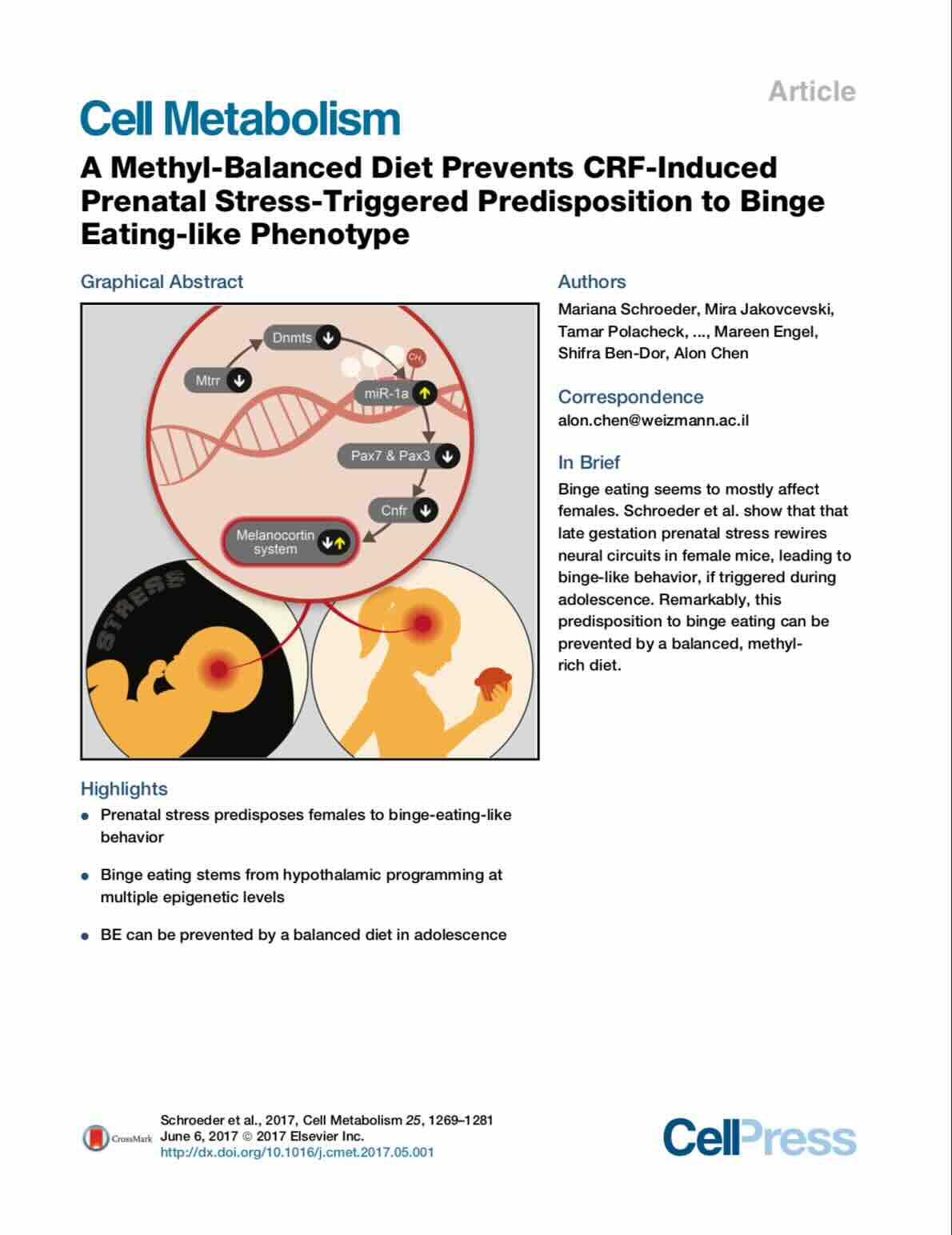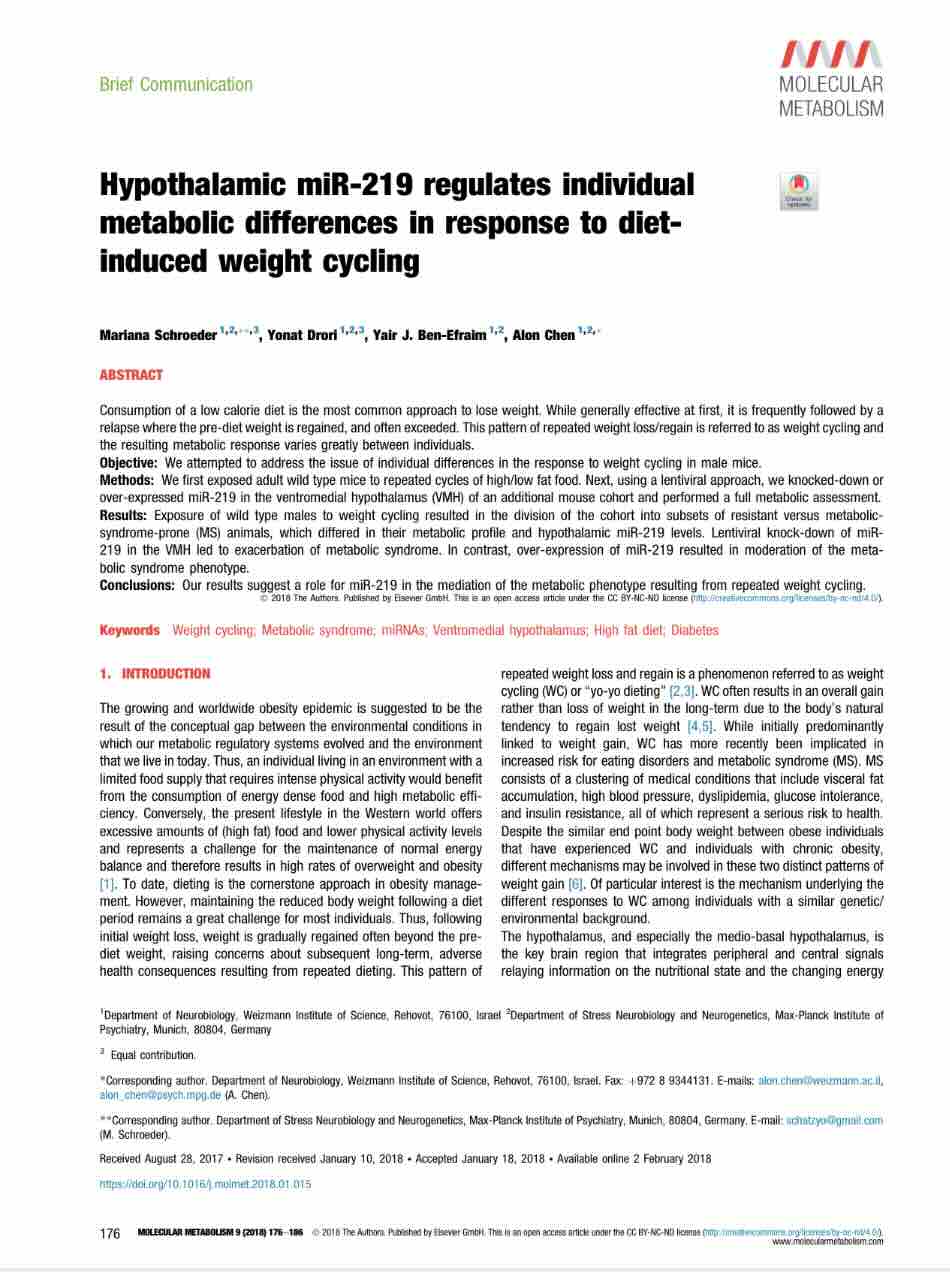Since the beginning of my scientific career, I have been deeply intrigued by the origins of vulnerability to mental health disorders—particularly how these vulnerabilities differ between the sexes. My early research focused on childhood obesity, but over time, my interests expanded to encompass a broader range of conditions, including eating disorders, depression, and anxiety. My work is driven by a set of core research questions, outlined below.
What is the link between early life stress, nutrition and mental health?
The current project explores the complex interplay between stress and nutrient availability during pregnancy and mental health, with a focus on how nutritional status and placental function can influence psychological resilience and vulnerability in the offspring. Emerging evidence suggests that chronic stress not only impacts eating behaviors but also alters metabolic and inflammatory pathways that are closely tied to mental health outcomes. By examining how specific nutrients modulate the body's stress response, my work aims to identify modifiable risk factors and potential intervention targets for conditions such as anxiety, depression, and eating disorders.
2024
Metabolism: clinical and experimental
The goal of this work was to explore pregnancy as a particularly sensitive period during which different types of stress (psychological or physiological) can have lasting effects on the baby's long-term health. Specifically, we looked at how stress during pregnancy can influence the way certain transporters involved in the transfer of the amino acid methionine affect the way the placenta functions, which in turn may shape the baby's metabolism for life. Our findings suggest that prenatal stress can trigger a broad, sex-specific response—affecting male and female babies differently. These changes impact how the placenta works, how genes are regulated (epigenetic programming), and may increase the risk of developing metabolic diseases later in life. Importantly, our research offers valuable insights into how early-life experiences may contribute to a greater risk of metabolic disorders in females.
2022
Frontiers in cell and developmental biology
In this review, I examined a different type of stress by looking into how different assisted reproductive technologies (ART) may influence the long-term health of children conceived through these methods. Since the first successful ART birth in 1978, more than eight million babies have been born using these techniques, and their use continues to grow—partly due to rising infertility and older parental age in industrialized countries. Given the strong evidence that lifelong health can be influenced by conditions in the womb, we reviewed recent research on how assisted reproductive technologies (ART) may impact metabolic health, brain development, and cognitive and emotional outcomes from the perinatal period through childhood and into adulthood. Notably, emerging findings suggest that individuals conceived through ART may experience more favorable long-term outcomes than previously anticipated. These results highlight the critical role of parenting and the early emotional environment in shaping a child's development and well-being—even when perinatal outcomes are less than ideal.
Do eating disorders have their origin in pregnancy?
Do eating disorders have their origin in early life and is there a link to the levels of stress experienced during pregnancy? I have long been interested in exploring whether eating disorders (EDs) have their root in the variable circumstances that shape pregnancy. Researchers in the field still struggle to find a clear genetic link, suggesting that the environment may have more influence on these diseases than previously believed. Because of the broad assumption that "trauma" or stress during pregnancy, childhood or adolescence are an integral part of all EDs, I designed the following studies in which I studied whether stress during pregnancy had any effect of the incidence of anorexia nervosa, binge eating disorder or obesity in adolescent mice.

2018
Molecular Metabolism
Here, my aim was to do a thorough examination of the broad assumption that early life adversities are a main cause for the appearance of eating disorders in adolescence. To do this, I examined the predisposition to develop anorexia, binge or compulsive eating, obesity/diabetes and metabolic syndrome after a stressful pregnancy. Contrary to the popular believe, prolonged stress during pregnancy does not increase the chances to develop anorexia or binge eating in females, but increses the chances of becoming excessively overweight when consuming a diet rich in fat. Males were not susceptible to eating disorders, but in contrast to the females, they became very lean when consuming high energy diets as a result of prolonged prenetal stress. Thus, early life trauma, at least in the form of chronic stress during pregnancy, does not necessarily predict eating disorders in females but precedes metabolic abnormalities in both sexes.
2018
Nature Communications
Does anorexia nervosa begin as early as during pregnancy? In the current study, we found that certain events during pregnancy—particularly those that affect placental function and allocation of nutrients—may contribute to an increased vulnerability to anorexia nervosa later in life. We identified a specific placental gene, which is expressed in a sex-specific manner, that appears to regulate the transfer of nutrients from mother to fetus, thereby influencing early brain development. The level of activity of this gene may either confer protection or elevate the risk of developing anorexia, suggesting that at least part of the predisposition to this disorder may originate in utero.

2017
Cell Metabolism
Does binge eating have its origin during pregnancy? Under a certain amount of stress in the third trimester, females show a particular brain footprint: the hypothalamus, the brain area responsible for energy balance and food intake, appears to become predisposed to this kind of pathological eating behavior. This detected predisposition is characterized by abnormal processing of molecules that are partially acquired through the diet. Thus, using an adequate diet, specificallly desgined for this defect the abnormality was fixed, which in turn balanced the manner in which genes are expressed, blocking the predisposition to binge. Thus, using a nutritional approach, the predisposition to this eating disorder was blocked.
2013
Developmental Psychobiology
In the first study of this profject, we were curious to know whether stress during gestation would have different effects on the level of anxiety and depression-like behavior experienced by each sex during adolescence. Using specific tests, we found that stress caused high levels of depression and anxiety in adolescent males, including hyperactivity, weight loss and risk taking behavior. The effects in females were more moderate. Altogether, we exposed here different effects gestational stress on animals of each sex on these psychiatric parameters.
Can environmental variables induce or prevent obesity and abnormal eating behavior?
Do environmental variables have the potential to induce obesity and abnormal eating behavior? Can the environment be manipulated to moderate obesity and correct pathological eating patterns in genetically predisposed subjects? In this project, I was interested in both the positive and negative effects a "problematic" environment can have on general health. I divided the manipulations on the environment in developmental widows and looked specifically - and separately- into the lactating period and early adolescence. Of particular interest for me were the differences in the responses of each sex to the manipulation of the lactating period, as well as the response to dieting, exercise and enriched environment.

2018
Molecular Metabolism
Are specific molecules involved in the propensity to gain weight as a result of repeated (yo-yo) dieting? We exposed male siblings to repeated cycles of weight gain and weight loss through changes in the fat content of the diet. A portion of these males became morbidly obese and diabetic, while another portion regained their original weight and remained healthy. We looked into the expression of certain genes in the hypothalamus (the brain area responsible for energy balance and food intake) and found a particular regulator of gene expression, through indirect regulation of serotonin and cannabinoid signaling, that appears to play a role in obesity and metabolic syndrome. Altogether, males with an innate predisposition to gain weight and become obese, present a different hypothalamic profile than their lean siblings.
2013
PloS One
Which are the long term health effects of lactating from an obese or a lean mother? Using a genetic rat model of childhood obesity, we found that females genetically predisposed to become obese but that were nursed by lean mothers showed drastic improvements in general health, including body weight, food choice, hormonal profile and fertility issues. On the contrary, genetically lean females nursed by obese lactating mothers became slightly overweight, with a disrupted hormonal profile and susceptibility to develop obesity when exposed to high palatable foods.
2011
ILAR
Here, we examined the effect of housing conditions on long-term health, using males and females of a genetic a rat model of obesity. We found that housing conditions had no effect on females, but reduced the obesity levels and improved the general health of male adults. Altogether, we showed here that the environment is an important variable in the study of obesity and energy balance as it is in studies examining emotionality and cognition.
2010
Hormones and Behavior
Given a genetic predisposition to become obese, could the health parameters be improved through acute dieting? We used a genetic rat model of obesity to examine the benefits of dieting during a limited period of adolescence, a limited period of adulthood or chronic dieting in females. We found that transitory dieting had very limited effects on the female long term health. Only chronic dieting helped in maintaining a low body weight and healthy profile in genetically predisposed females.
2010
Hormones and Behavior
Given a genetic predisposition to become obese, could the health parameters be improved through acute dieting in males? We used a genetic rat model of obesity to examine the benefits of dieting during a limited period of adolescence or until adulthood on adult health. We found, as expected, that long term dieting had positive effects on obesity levels. But more interestingly, transitory dieting during adolescence in males produced promising improvements in general health, suggesting an intervention during a critical period during development can have enduring effects on the manner energy balance is regulated throughout the lifespan.
2010
Hormones and Behavior
Given a genetic predisposition to become obese, could the health parameters be improved through exercise during a limited period of adolescence? We used a genetic rat model of obesity to examine the benefits of exercise during a limited period on adult obesity. We found that access to a running wheel during adolescence improved the males general health and reduced long term obesity, despite not doing any further exercise in adulthood. For the females, the effects were far more limited despite some improvements in general health.
2010
PloS One
Which are the short and long term health effects of lactating from an obese or a lean mother? Here, we found that the health of the lactating pups was not determined by their genetic, but by the genetics of the mother. However, the long term effects were far less evident. Lactating from a fat mother appears to have long term negative effects in animals of both sexes. In contrast, positive effects from lactating from a lean mother were mostly observed in males. This study exposed the importance of a healthy lactating environment on long life body weight and metabolic parameters, in particular for males.
2010
Behavioral Brain Research
Here, we examined the maternal contribution to stress related behaviors in cck1 mutant rats, which innately show high levels of anxiety. when raised by healthy control mothers, mutant female rats showed a healthy behavioral profile, while in the males, anxiety levels were not improved. being raised by a mutant mother had no behavioral effects on controls. The findings show a contribution of genetics, sex and early maternal environment to anxiety-like behaviors in the offspring.
2009
Developmental Psychobiology
What are the maternal–infant interactions contributing to childhood obesity? Here, we crossed genetically obese litters with lean litters and concentrated on maternal behavior. Obese mothers nursed more frequently and had high fat milk, which induced obesity in all pups, leading to life long overweight. Genetically obese pups nursed by lean mothers only showed transient positive effects during childhood.
2009
American Journal of Physiology
The aim of the present study was to establish a rat model of childhood obesity and determine the critical windows during which abnormal adiposity emerges. the results suggest an influence of the mother obesity during gestation and a high investment in nursing time during lactation on the pup obesity levels during childhood.
2009
American Journal of Physiology
Here, we characterized the behavioral and physiological aspects of obesity development from weaning to adulthood in a genetic animal model and compared the different processes between the sexes. The findings highlighted the importance of using sex-appropriate approaches to increase the efficacy of therapeutic interventions in the treatment and prevention of chronic obesity.
2007
Developmental Psychobiology
Using a genetic animal model of obesity, the present investigation examined the pup ability to gain weight from the nursing episodes. this was the first study to look into the pups behavior as a variable in their own overweight. The results suggest an important contribution of the pups toward their own preobese development.
2007
Developmental Psychobiology
Our goal in this study was to investigate the nursing behavior of obese mothers throughout lactation, during the day and the night in order to elucidate their contribution to the pre-obesity of the pups. we found several abnormalities in the obese mother behavior, specifically during the third week, leading to obesity in the offspring.
2006
Physiology and Behavior
This was the first study to examine the early developmental stages of the OLETF genetic rat model of obesity. to better understand the early circumstances that make OLETF pups obese, we investigated body weight from postnatal day (PND) 1 and examined diurnal maternal behavior over the first three postpartum weeks by undisturbed observations. Taken together, these data demonstrate that OLETF males and females are heavier from birth and suggest that maternal factors may contribute to weight differences between the strains.
Collaborative publications
2009
Behavioral Neuroscience
2008
International Journal of Obesity
2006
American Journal of Physiology
2006
Behavioural Brain Research
2005
Behavioural Brain Research


